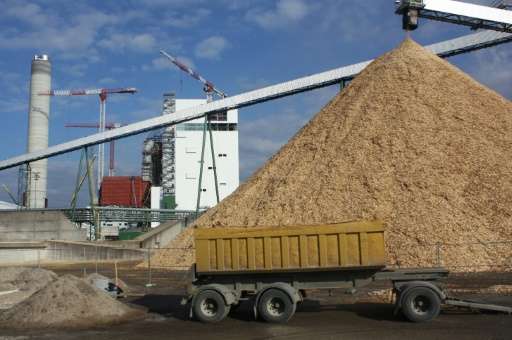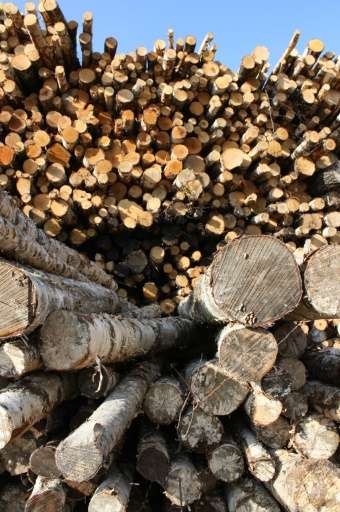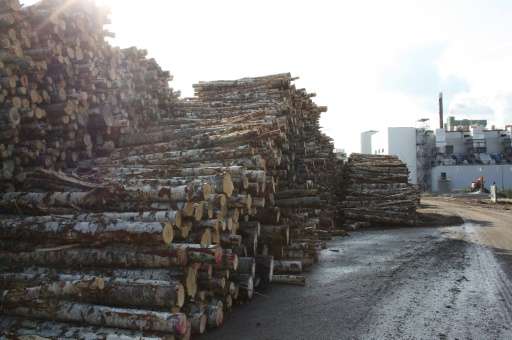Finland pining for post-Nokia economic champion

Nokia was once the motor of Finland's economy, but since the demise of the company's mobile phone business the Nordic country has struggled to find a new engine for growth.
But after nine sluggish years and a three-year recession that ended in 2015, could Finland's centuries-old, if unglamorous, forestry sector, hold the answer?
A rare bit of good economic news came out of the small industrial town of Aanekoski when forestry giant Metsa Group announced last year a record investment of 1.2 billion euros ($1.31 billion) in a new facility.
A gust of wind spreads the unpleasant odour of sulphur—akin to rotten eggs—across the town in central Finland, a regular reminder to the 20,000 residents of the quest for new riches.
A new mill and biorefinery that will more than double the town's annual production of pulp—a wood fibre mass used to make paper and cardboard—is under construction.
Locals do not seem bothered by the stench.
"It's just money that smells," 50-year-old Petteri Heimonen, a local IT technician, told AFP on a recent visit.
The forestry industry's main products, paper and cardboard reclaimed the top spot as the country's main export in 2015, followed by other heavy industry products: diesel fuels and stainless steel.

But it is not the new high-tech miracle Finns have been hoping for since the country's only globally well-known consumer product, Nokia's mobile phones, disappeared from the scene after failing to catch up with the rapid rise in smartphones.
High-tech hopes
Analyst Tomi Amberla of Poyry Management Consulting believes the forestry's number one spot says a lot about the dire state of business in Finland's post-Nokia era.
It shows "that other sectors have been in trouble... There is small growth in forestry's export income and quantities, but it's quite flat, meaning others have declined," he told AFP.
Amberla stressed that Finland has diversified economic growth with high-tech consumer products and service exports.
High hopes have been cast for instance on Finland's games industry, led by Clash of Clans creator Supercell and Angry Birds inventor Rovio.

But this industry's combined net revenue last year equalled just a little over four percent of Nokia's revenue of 51 billion euros at its peak in 2007, when it was the world's number one handset maker.
It is unlikely that the forestry sector can compete with Nokia's figures, even though many companies are also multinational.
In 2015, the sector registered only 44 percent of Nokia's peak revenue in 2007, when measured at comparable prices.
The global financial crisis that began in 2007 hit Finland's export-driven economy hard and the forestry sector was particularly affected, posting a 10-percent drop in production in 2008.
The industry's main product, fine paper, took a hit from both the global economic slowdown and from the rapid shift in media consumption from paper to online articles.
"Five to 10 years ago forestry was considered a sunset industry," manager Riikka Pakarinen of the Finnish Forest Industries Federation acknowledged.

Biodiesel to fuel growth
By 2015, Finnish paper giants UPM-Kymmene, Stora Enso and Metsa Group had shut more than 30 paper-making machines around the country, most of them located in small towns highly dependent on the companies for jobs and tax revenue.
But with forests covering 78 percent of Finland's land surface, they are unquestionably one of the country's most important resources.
Metsa Group is not alone in hoping trees can mean new growth in two senses.
Another group, Finnpulp, plans to build a new pulp and biorefinery in the eastern town of Kuopio, while Chinese Sunshine Kaidi New Energy Group plans to invest a billion euros in a refinery making renewable diesel from wood materials in the northern Finnish town of Kemi.
Finland's leading forestry giant UPM is already in the business.

Last year in the southeastern town of Lappeenranta it launched a biorefinery that turns resin, a side product from making pulp, into diesel.
"It's the world's first facility to produce wood-based diesel," UPM's head of biofuels Sari Mannonen said.
She anticipates growth especially in western Europe, where the EU's climate targets urge replacing fossil fuels with new green options.
Analyst Amberla said forestry investments are grounded as global demand for pulp is rising, driven by increasing urbanisation and a growing middle class, especially in Asia.
But there is a limit to just how much forestry can do: Finland's Natural Resources Institute estimated the harvested share of forests amounted to 79 percent of their annual growth in 2014.
© 2016 AFP


















